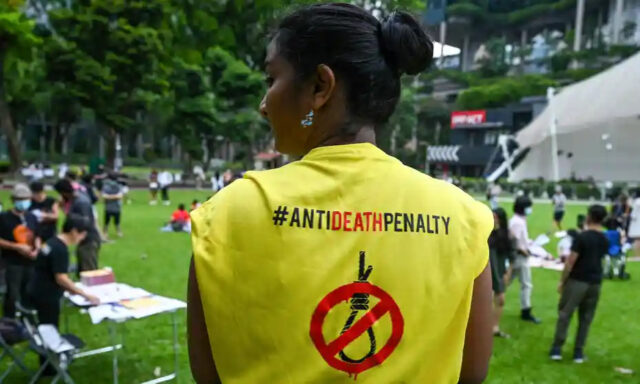The news was delivered in just a few cold sentences. An appeal for clemency for Nagaenthran Dharmalingam, a man on death row whose case has prompted a global outcry, had failed.
“Please be informed that the position…remains unchanged” wrote Singapore president’s principal private secretary, in a letter to Nagaenthran’s family: “The sentence of death therefore stands.”
Nagaenthran’s relatives and supporters have campaigned tirelessly for his life to be spared. He was arrested in 2009, aged 21, for attempting to smuggle a small amount of heroin – about three tablespoons – into Singapore and has since spent more than a decade on death row. His lawyer has argued that he has an IQ of 69, a level recognised as indicating a learning disability, and should be protected from execution under international law. Nagaenthran has said he was coerced into carrying the drugs.
Nagaenthran’s case has appalled rights groups, and provoked an outcry from voices around the world – from billionaire businessman Richard Branson, a critic of the death penalty, to EU representatives and UN experts. Domestically, it has also prompted some younger Singaporeans to question a system that the government has long claimed makes the city state “one of the safest places in the world”.
“The death penalty is applicable only for a very limited number of offences, involving the most serious forms of harm to victims and to society, such as intentional murder and trafficking of significant quantities of drugs. We have put in place many judicial safeguards surrounding its use,” the government says.
The Singapore government does not disclose how many people are on death row. Since 2019, eight death row prisoners have been given execution notices, placing them at imminent risk of hanging. One of these men was hanged last month.
‘Sense of injustice’
Death penalty cases are rarely reported in any detail in Singapore’s tightly controlled media, but Nagaenthran’s story has been shared widely online. Isaac Chiew, a 22-year-old university student, said he hadn’t thought very much about the death penalty, until he came across Nagaenthran’s case on Instagram. “Reading all the details really made me feel this sense of injustice,” he says. “It just made me feel – this could have been my friend or me in a different circumstance.” Nagaenthran was just a young man who had been in the wrong place at the wrong time, says Chiew. He began to read about others on death row, and was struck by stories of people who were condemned to death simply for falling in with the wrong crowd or making a mistake.
Profiles of some death row inmates shared online by campaigners show they are not big time criminals, but rather men from marginalised communities who have faced poverty, or struggled with addiction.
“Social media has allowed us to centre the voices of death row prisoners and their families,” says Jolovan Wham, a human rights activist.
In a rare protest this month, more than 400 people turned out at Speakers’ Corner at Hong Lim park, the only place where demonstrations are permitted in Singapore, to call for executions to be halted.
Kirsten Han, a journalist and activist who has spent a decade campaigning against the death penalty, believes its likely the highest turn out ever seen at such a demonstration. The message, too, was different.
“Previously a lot of other death penalty events might have been focused on – give this person a chance,” said Han. But protesters were now critiquing the whole system. They weren’t, she added, just expressing pity for any one person; they were calling for abolition of the death penalty. Most of the attendees were young Singaporeans.
The Singaporean authorities have shown no willingness to move towards dropping the death sentence, despite a global shift towards abolition, said Ariel Yin Yee Yap, a doctoral researcher and teaching associate at Monash University.
“My research indicates a long pattern of state justification and legitimisation, to both the international community, and domestic audiences, [of] its continued practice of capital punishment,” she said. The government argues that capital punishment is the most effective deterrent against crime – an idea debunked by criminological research, she adds.
Public support
Research suggests that the death penalty is supported by the overwhelming majority of Singaporeans – but that this is not an unconditional or strongly held view. A study by the National University of Singapore found that seven in 10 Singaporeans said they agreed with capital punishment in general, but that support fell when people were presented with different scenarios and asked to choose whether the person convicted should be executed. Support also depended heavily on the premise that it was a more effective deterrent than other forms of punishment, and that no errors were made when such sentences were administered.
Research suggests the more information people have about the death penalty, the more their support wavers, said Han. “That’s part of the challenge. How do we give them these details when it can’t get into mainstream media?”
Han hopes attitudes will change with time. But she adds that, public opinion aside, governments should still commit to abolishing the death penalty. “Human rights issues should not be subjected to whatever the majority votes for.”
For Nagaenthran, there are no more procedural steps left. His last ditch appeal was rejected last month as baseless by Singapore’s top court. The clemency, now refused, was the only option left.







